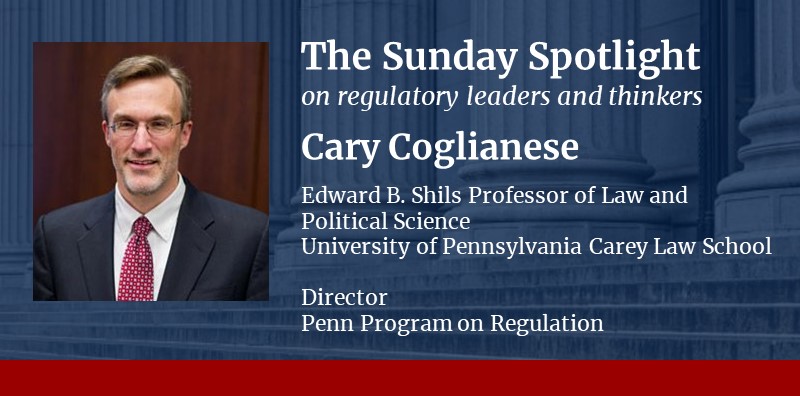
Cary Coglianese discusses how regulators can sharpen their skills and produce better regulatory outcomes.
In this discussion, regulatory scholar Cary Coglianese explains how regulators are similar to mountaineers. Both take good judgment, teamwork, and strong decision-making skills.
Whether a regulator works on environmental, technological, or health care issues, Coglianese contends that all regulators should focus on achieving the “utmost integrity, stellar competence, and empathic engagement” in their field. Coglianese also stresses that regulators need to understand their industries inside and out to understand the causes of problems that need regulatory fixing. He also offers our readers some recommended books to improve regulatory practitioners’ skills.
Coglianese is the Edward B. Shils Professor of Law and the director of the Penn Program on Regulation at the University of Pennsylvania Carey Law School. A national expert on administrative law and regulatory policymaking, his research has focused on cross-cutting issues related to regulation, such as public participation, transparency, and negotiation in the regulatory process. His work also spans a variety of substantive issues, including environmental regulation, health and safety, and law and technology. Some of his most recent work analyzes the possibilities and challenges raised by artificial intelligence and its use by regulators.
Coglianese has published more than 200 articles and book chapters. His book, Achieving Regulatory Excellence, brings together perspectives on regulatory quality from experts around the world. In his introduction to Achieving Regulatory Excellence, Coglianese notes that “regulators tend to face some of the most difficult challenges in society.” He emphasizes that, even though regulation is often thought to be a highly complex enterprise, the best regulators need to possess much more than just technical expertise. Regulatory excellence, he argues, comprises “people excellence” because regulators ultimately need to understand and be able to shape the behavior of other people.
The Regulatory Review is pleased to share the following exchange with Coglianese, adapted from an interview that appeared previously in Regulatory Focus.
TRR: What is the mission of the Penn Program on Regulation (PPR), and could you talk about your role as the program’s director?
Coglianese: The Penn Program on Regulation is based at the University of Pennsylvania Law School but draws together more than sixty faculty from different disciplines across our entire university. We focus in particular on important emerging issues related to regulation and bring together leading researchers and professionals to conduct cutting-edge research. Our major research initiatives in recent years have focused on timely issues such as global trade, regulatory quality and management, and the relationship between regulation and employment. Currently, we are studying the connections between regulation and inequality, and we have underway a major study on how the benefits and costs of regulation have been distributed across eight major federal regulatory areas in the United States.
We also sponsor a publication—The Regulatory Review—which provides an open platform for researchers, lawyers, analysts and public officials to share new ideas and exchange views across the political spectrum. In addition, we sponsor a variety of executive education training opportunities, research seminars, workshops, and conferences. As the program’s founder and director, I see my role as one of building on the extraordinary intellectual energy and talent of my amazing colleagues, graduate fellows and students, supporting and channeling their work in a productive direction—and then helping to communicate with the world outside the university about what our research and teaching has to contribute.
TRR: Regulatory excellence is an important concept and one that you and your PPR colleagues have examined extensively. In simplest terms, how do you define regulatory excellence and why is it important?
Coglianese: To help guide regulators on a path toward excellence, I’ve defined regulatory excellence as an integration of three core attributes—utmost integrity, stellar competence, and empathic engagement.
When talking about regulatory excellence, I think most people immediately understand the significance of stellar competence. Excellent regulators must deliver substantive outcomes that maximize public value, promoting effectiveness, efficiency, and equity. They must be knowledgeable and well-trained.
They also need to be honest, so I suspect most people readily see the importance of utmost integrity too—although, for a regulator, integrity actually entails much more than merely a lack of corruption. It also demands a consistent commitment to delivering public value, following the law and staying even-handed.
When it comes to empathic engagement, though, I find too many regulators tend to overlook its significance. Partly that’s because simply staying on top of the technical aspects of regulation—maintaining competence—can be so demanding that it seems to leave little time or energy for active listening and engagement. But regulation is fundamentally a social enterprise. It is all about trying to influence what people do in their businesses and other regulated activities, all in the service of still other people in society.
For this reason, regulatory excellence requires what I call “people excellence.” That is, it depends vitally on regulatory professionals who themselves are constantly striving to maintain and strengthen their integrity, competence and ability to engage empathically with others.
TRR: What skills or attributes do you think are required to succeed in a regulatory career?
Coglianese: Regulatory professionals need to apply their general analytic skills in varying contexts. They need to know a lot about the industry—whether they are working in the industry or in government. They need to understand the problems that regulation aims to solve in that industry—what causes these problems, what conditions exacerbate them, and so forth. They also need to know about the technological, scientific and business aspects of the industry and how they contribute to problems as well as provide opportunities and constraints for regulatory solutions.
No matter what their professional role, though, individuals will do well to keep in mind the three attributes: utmost integrity, stellar competence and empathic engagement. Of course, I recognize these three attributes may be oversimplifications and that different careers will demand more of one of these attributes more than others. But simplification into three core attributes is helpful because, quite frankly, the full set of fine-grained attributes of a successful regulatory professional is simply too large for any us to keep in mind.
I’ve asked hundreds of people what they think makes a regulator excellent, and collectively I’ve heard mentioned just about every positive adjective in the English language—except those for physical beauty, taste, and smell! But by distilling the attributes of excellence into core features, rather than trying to keep dozens of more specific qualities in mind, we can focus on major priorities.
TRR: What book would you most recommend to regulatory professionals and why?
Coglianese: It’s hard to single out any one book because regulatory professionals need to know so much. I’m currently finishing a book, The Handbook for Regulators, which, once published, will be my answer anytime someone asks, “What one book should I read?” Targeted especially to regulatory practitioners, The Handbook seeks to distill the state of knowledge in the broad range of relevant disciplines and offers fundamentals on the range of tools that regulatory professionals need to know how to use, such as benefit-cost analysis, risk analysis, program evaluation, enforcement strategies and much more.
Other than that, I can suggest a few already-published books that stand out. Eugene Bardach’s classic guide to policy analysis—A Practical Guide for Policy Analysis: The Eightfold Path to More Effective Problem Solving—remains the most accessible treatment of how to think systematically about problem-solving in a public policy context. A few others include: Economics of Regulation and Antitrust by Kip Viscusi and my Wharton colleague, Joe Harrington; Cass Sunstein’s After the Rights Revolution: Reconceiving the Regulatory State; and Stephen Breyer’s earlier Regulation and Its Reform.
When I teach students about how the rulemaking process works in Washington, DC, I have them read David Kessler’s memoir, A Question of Intent: A Great American Battle With A Deadly Industry. It offers a gripping account of what it was like for Kessler, as head of the FDA, to try to bring the tobacco industry under his agency’s regulatory purview. And I’d be remiss if I didn’t mention my own edited volume, Achieving Regulatory Excellence.
TRR: What do you like to do outside of work?
Coglianese: One of the distinctive features of an academic life is that “work” is itself intrinsically rewarding. I’m privileged to do what l thoroughly enjoy: reading, studying, writing and talking about regulation. When I’m not doing those activities, I swim for fitness and enjoy spending time with my family. I have also taken a particular fascination over the years to reading books about high mountaineering expeditions: Jon Krakauer’s Into Thin Air and Joe Simpson’s Touching the Void are among the better known examples in this genre. Perhaps my fascination as an armchair mountaineer stems from having grown up in the flatlands of the Chicago suburbs. Or perhaps it is because, even in remote locations in high mountains, mountaineers are a lot like regulators. To succeed, they need great technical skill, good judgment, an ability to work together well as a team, and a capacity for making highly consequential decisions, often under considerable uncertainty.
The Sunday Spotlight is a recurring feature of The Regulatory Review that periodically shares conversations with leaders and thinkers in the field of regulation and, in doing so, shines a light on important regulatory topics and ideas.



